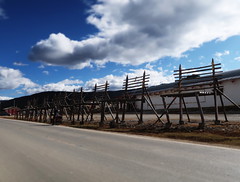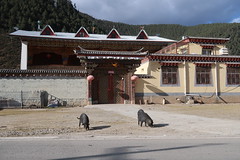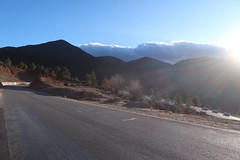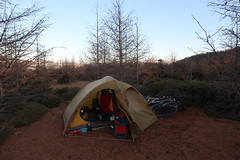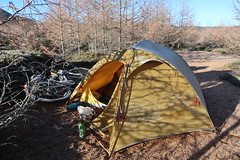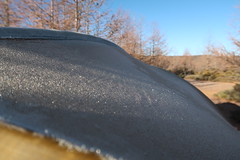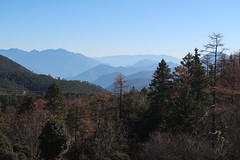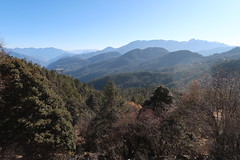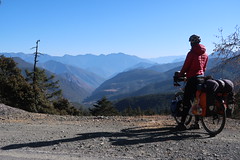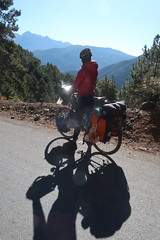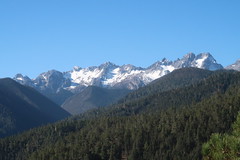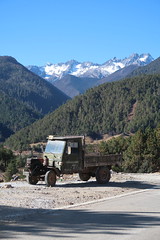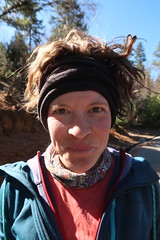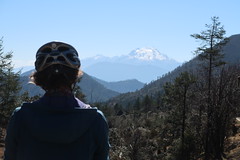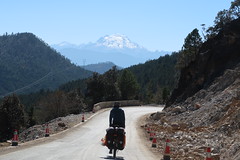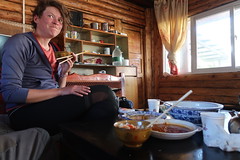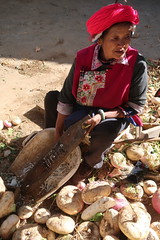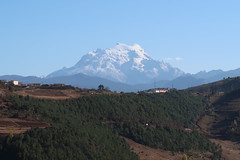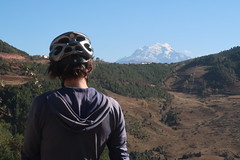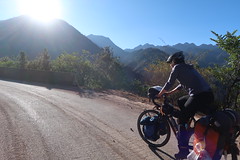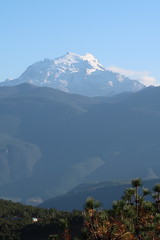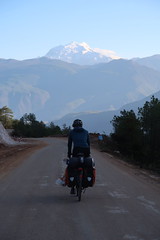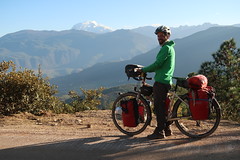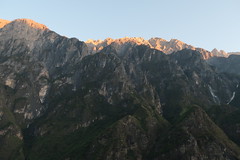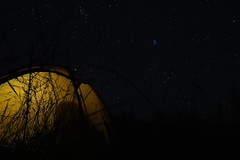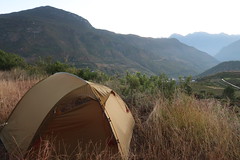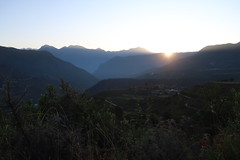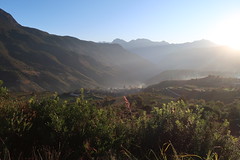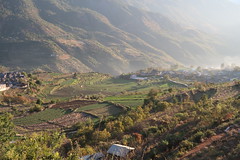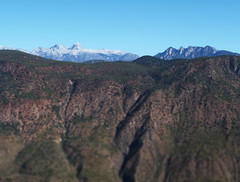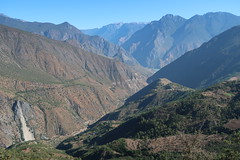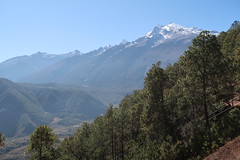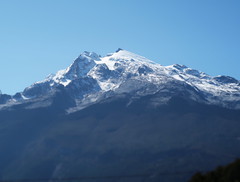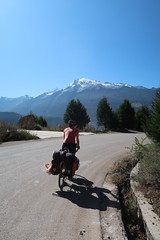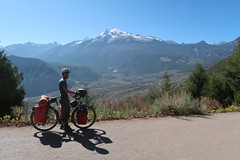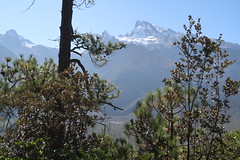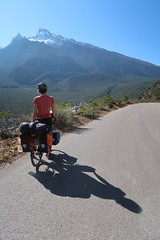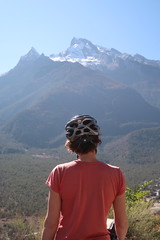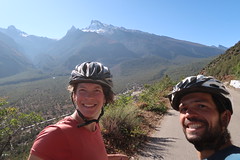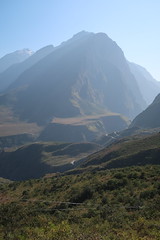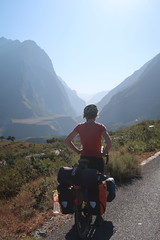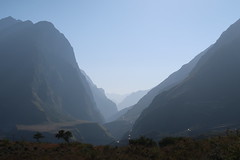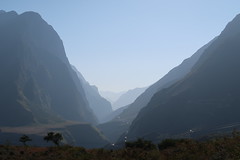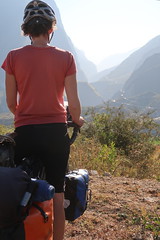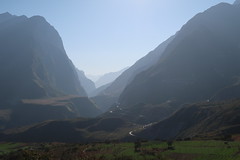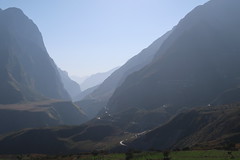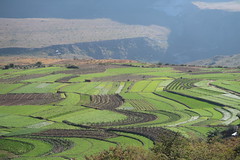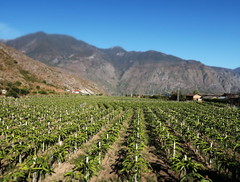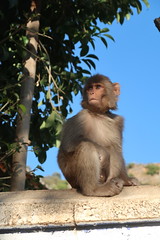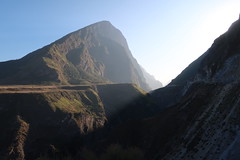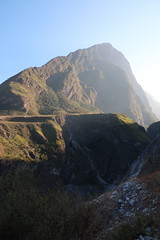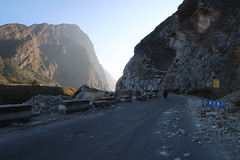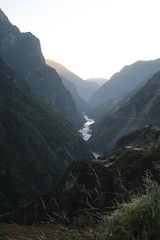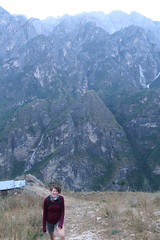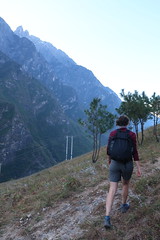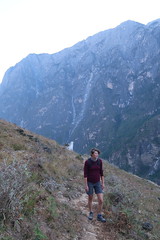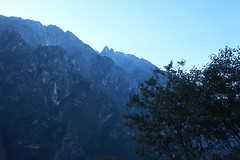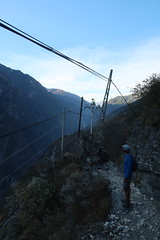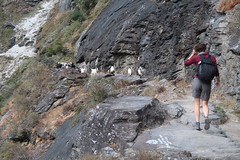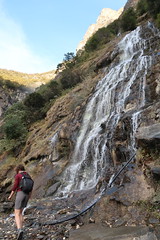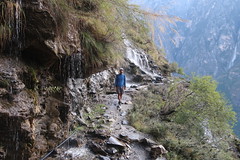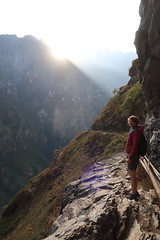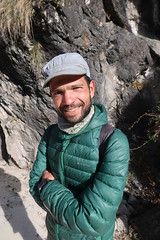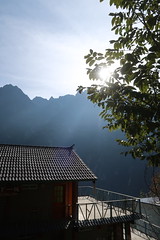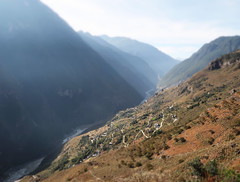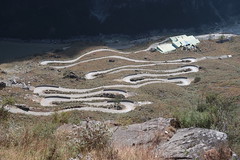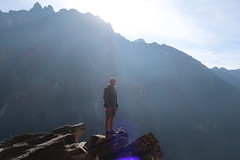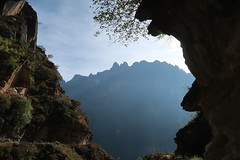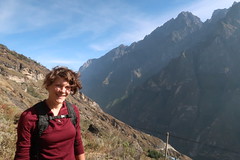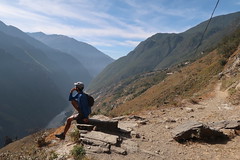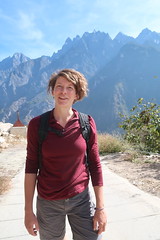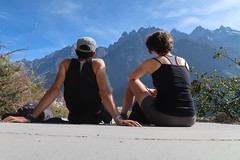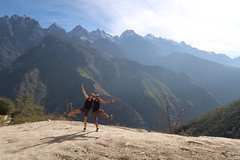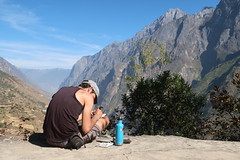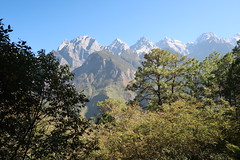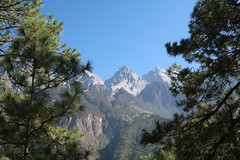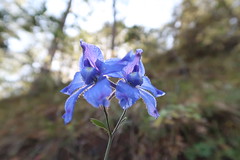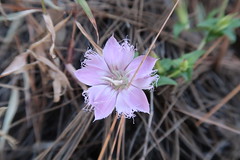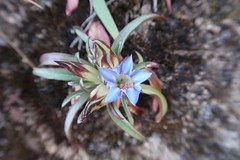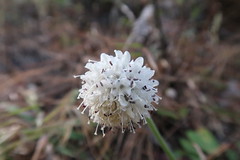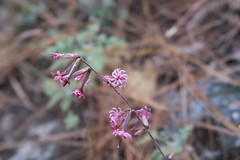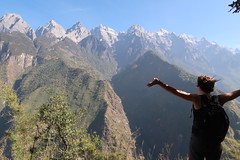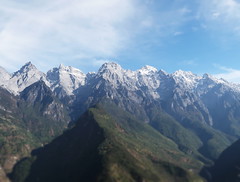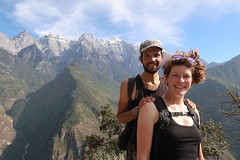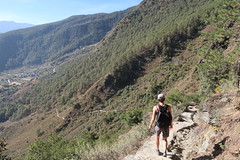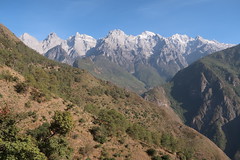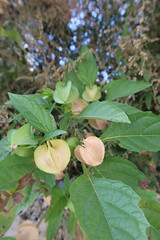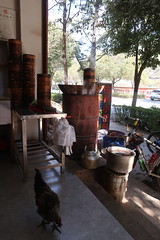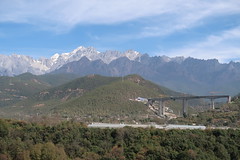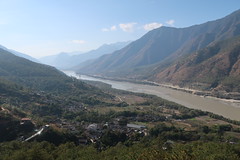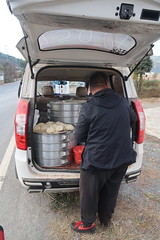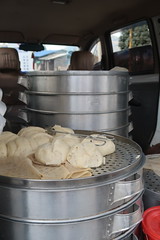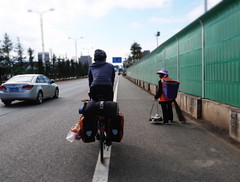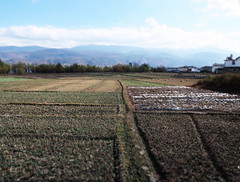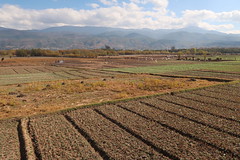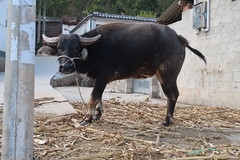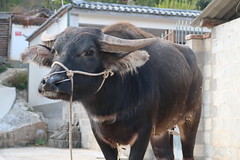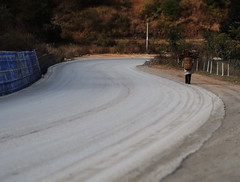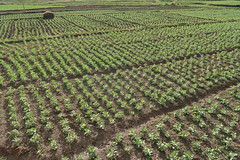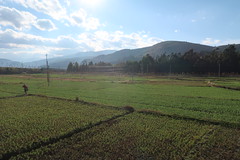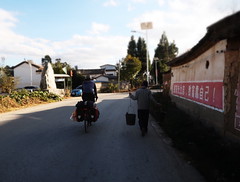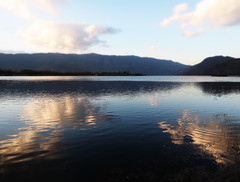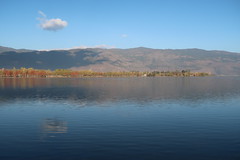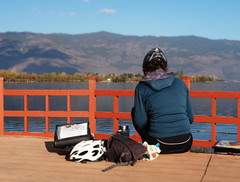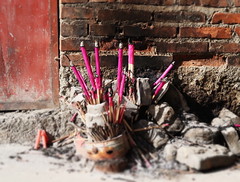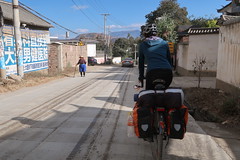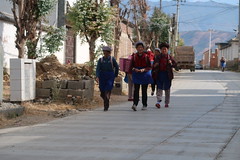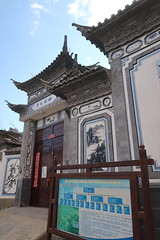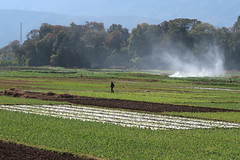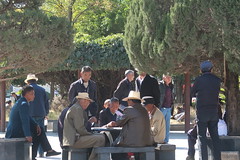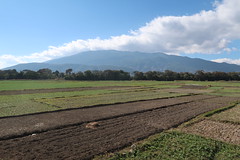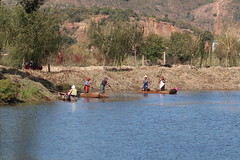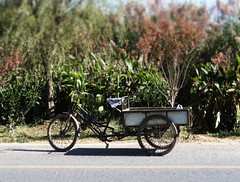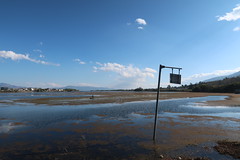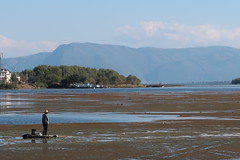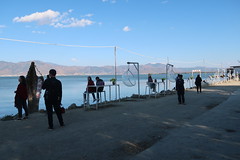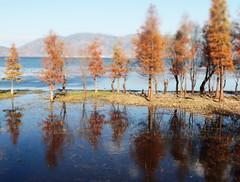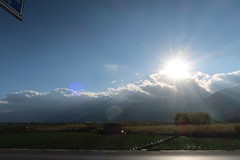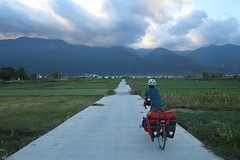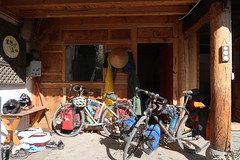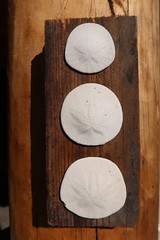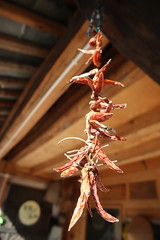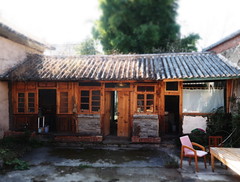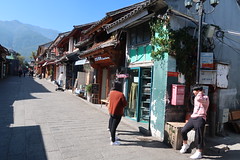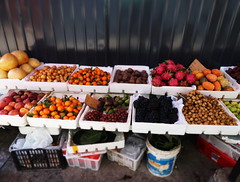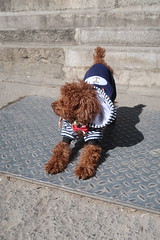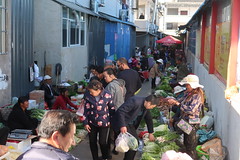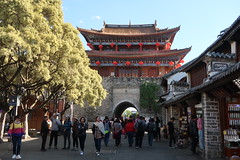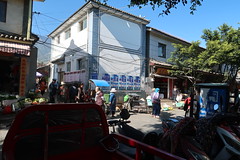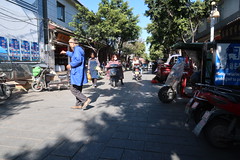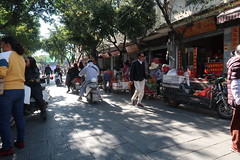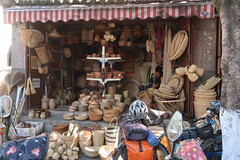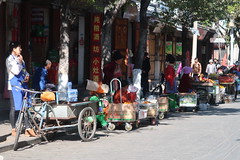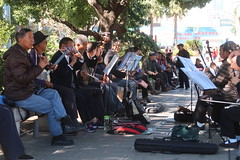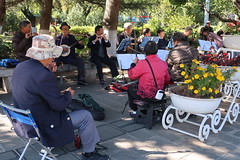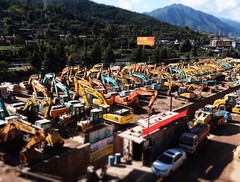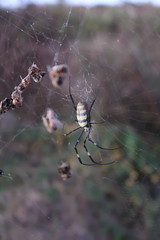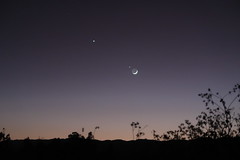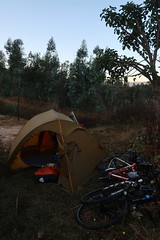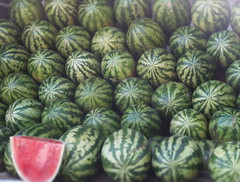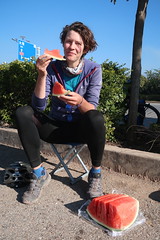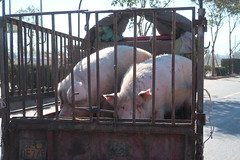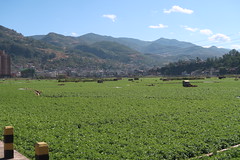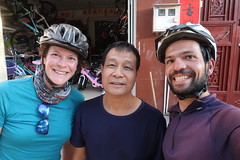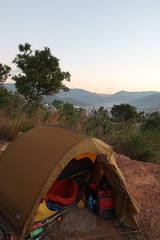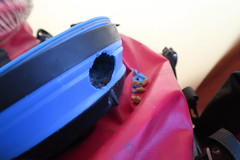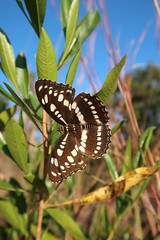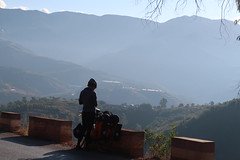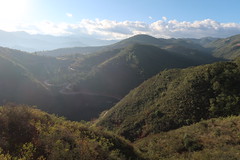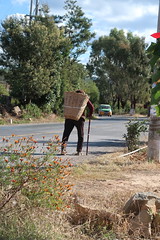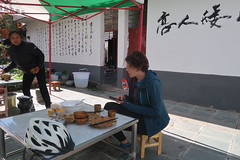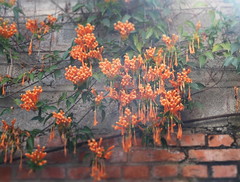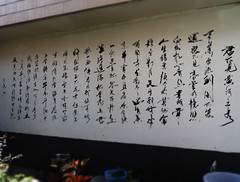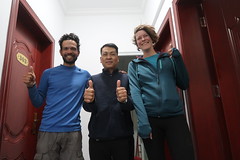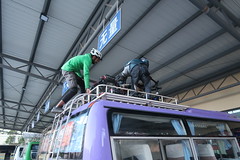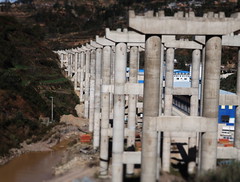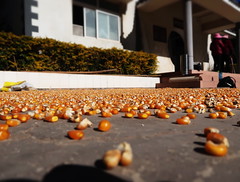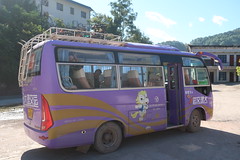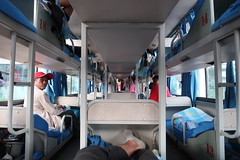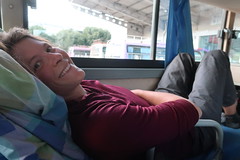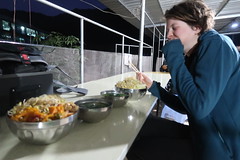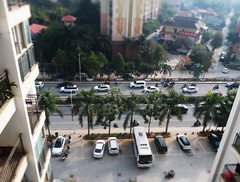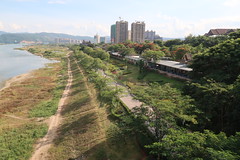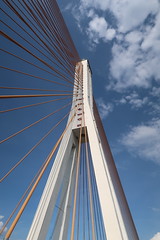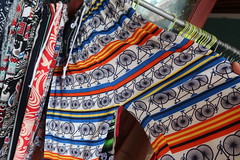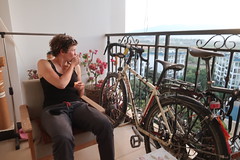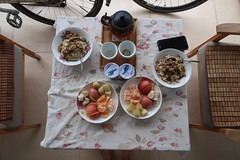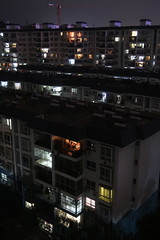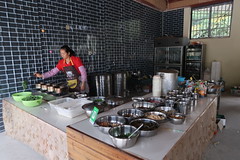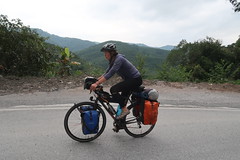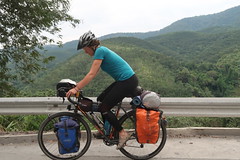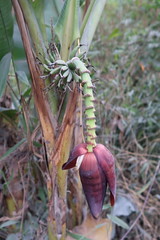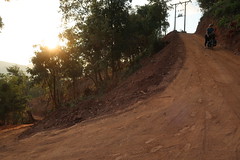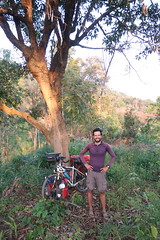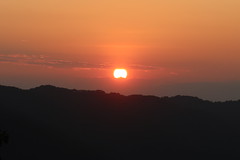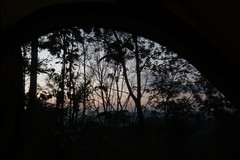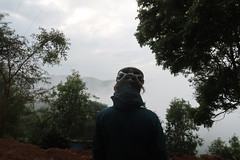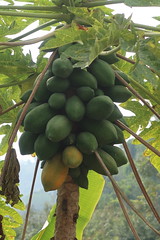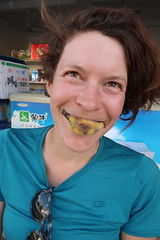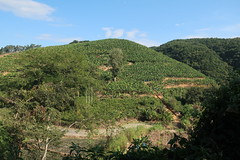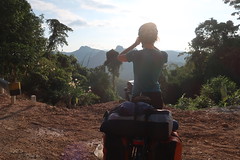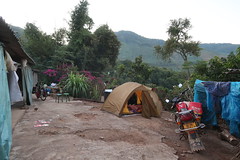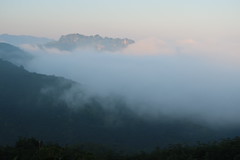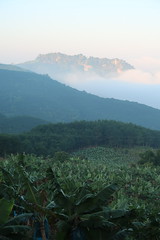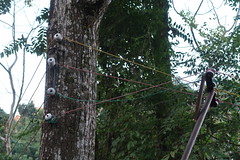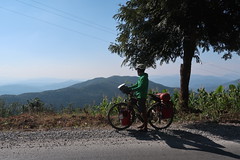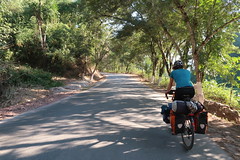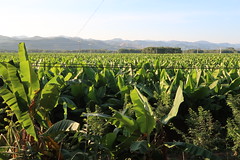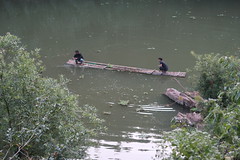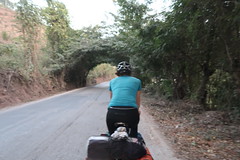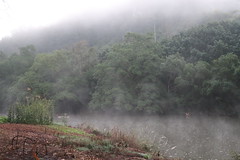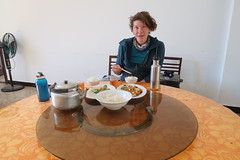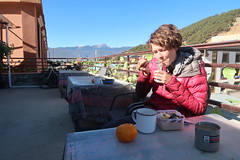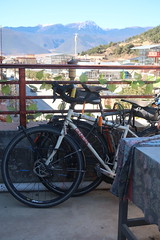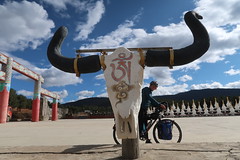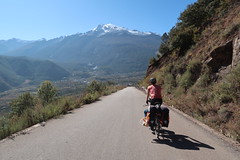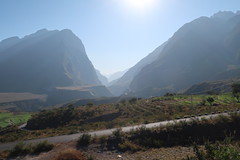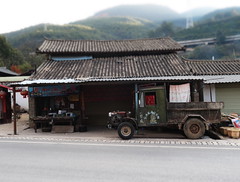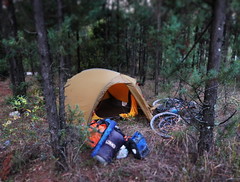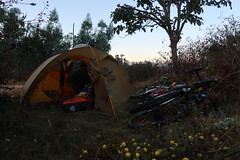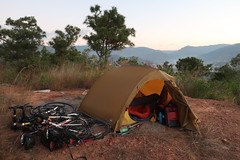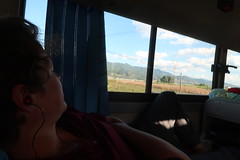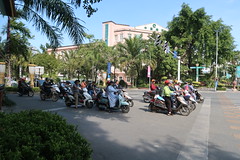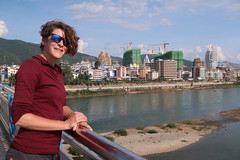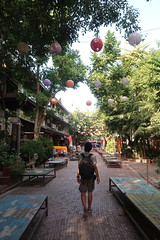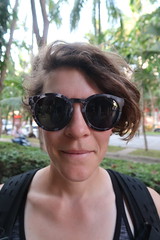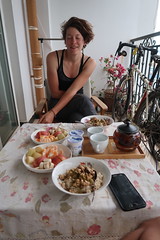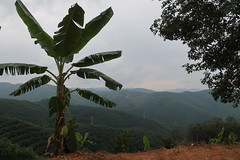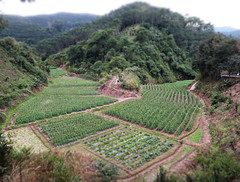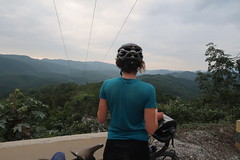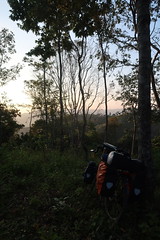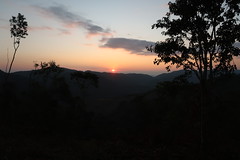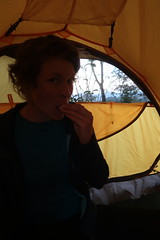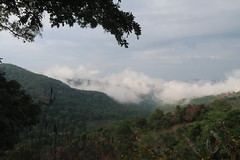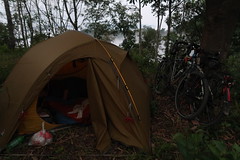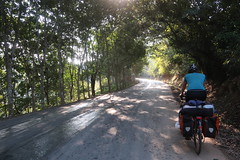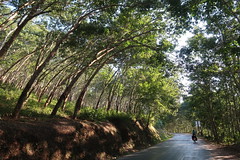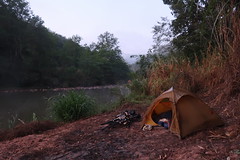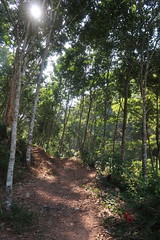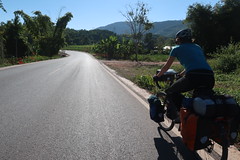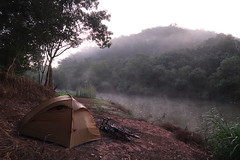From Shangri-La our plans were dictated by the number of days remaining on our Chinese visa (and also our desire to meet our favourite cycling Dutchies in time for Christmas =)). We had more than 1000km to cover in just over 14 days. Given that the terrain was relatively flat (in comparison to our previous three weeks of cycling) it was doable, but there wasn’t going to be loads of time for messing around. So, naturally we planned to take a detour towards Tiger Leaping Gorge to go hiking… Obviously.
Despite being below 3000m, our nights of freezing campings were not completely behind us. With the increased humidity at lower altitudes, we still ate breakfast from the coziness of our sleeping bags and waited for the sun to hit the tent before we could start to defrost it.
The cold however was definitely worth it as it also meant we had amazingly crisp views over beautiful snowy peaks, like the Haba mountain!!
While Shangri-La was a disappointment, Tiger leaping gorge exceeded all expectations. As we rounded the final switchback, we were faced with a barely credible view down the valley. More than incredible, it was truly hard to believe our eyes. It was late afternoon and in the hazy light the seemingly endless overlapping hills disappeared into the distance. Up until this point we had been unsure about making the hike or not in the gorge, but at that moment, our minds were definitely set.
After lots of stopping to take in the view, we eventually found a guesthouse to stay for the night, and made a plan. With the days ticking on our visa, we would shorten the 22km walk to 18km and try and do the hike in one day instead of two. We were fit and healthy right? We would be doing the hike the “wrong-way”. Most people start the hike with a gradual climb, warming their legs up slowly winding up the side of the gorge. We, on the other hand, would climb up 350m over about 2km.
In fact, in the end we lost the path pretty much as soon as we left the hostel and ended up following a sheep track up the side of the gorge. Naturally this was even steeper. Oh good old legs…
The hike was indeed beautiful but undeniably in China. We were treated with continuous mountain views to the west of the magnificent Jade Dragon Snow Mountain massif. As we walked along some stretches, it was more likely that we would meet a pylon and messy tangle of cables than we would a tree. And we found discarded oxygen canisters even here – where we were barely above 2000m.
We met several pairs of foreign tourists (hiking the “correct way”), but the only Chinese tourists we met were on horseback, dressed as though they were going on a high mountain expedition, being led in a line of 20 up to the first viewpoint and then back down again.
At the far end of the gorge, we caught sight of the sort of feat of engineering that was standard for China and unseen anywhere else – a 766m long suspension bridge being built 260m above the river below.
The west side of the gorge was too steep to support the foundations of a tower to secure the suspension cables of the parallel road and railway bridges. So instead, the cables were terminated directly into the mountain side at the tunnel foundations – creating the longest single-tower suspension bridge in the world.
Descending back to the road, it was apparent that although we may have strong legs for climbing up hill we do not have strong legs for descending steeply downhill for several kilometers. Our legs maintained the strength of jelly for some days afterwards.
Back on the bikes, with aching limbs, heading south, it took us a little while to adjust to the price of food. At these lower altitudes where we could see the rice and veggies being grown all around us, our lunches became half the price of what they had cost up on the Tibetan Plateau. Obviously this didn’t last long as we started ordering a third dish of veggies to make the most of the price decrease, ending up paying the same.
As we went along, at any tourist hot-spot that we passed through (as anywhere else in China) we were kept hilariously amused by the large number of people taking highly posed selfies. Groups of friends would make countless poses, before hopping back on a bus or into a car. Around Erhai lake on the outskirts of Dali there were even selfie props which although we declined to use, hundreds of others were kept entertained by.
For better or worse, people here were very unself-conscicious. From happily hacking up phlegm in the street, to adults giving us the sort of crazily enthusiastic thumbs up that we had only received from children in other countries.
The change in culture from the Tibetan plateau was obvious though. The houses, clothes and faces had all changed, and the traffic was honkier. With the growing population density it was becoming increasingly difficult to find a quiet wild camping spot where we weren’t perched on the edge of civilization. We camped the closest to towns and houses that we have anywhere on this trip to date, and we (well Sarah especially) did not enjoy it. Camping became a functional necessity rather than one of our favourite times of the day.
Nonetheless pedalling south through Dali and towards Pu’er, we were enjoying the luminous green rice paddies, fields of incredibly ordered veggies and occasional water buffalo, when an ominous clicking sound rose it’s head from Sarah’s backwheel.
It was one of those bad sounds where you know something is wrong. On closer inspection the wheel now also had a significant wobble, and we started to get a sinking feeling of deja-vu. The exact same thing had happened in Edirne on the outskirts of Istanbul. Had I really broken another rear hub?! Pedro was still on his first hub and I had broken my way through two?!
It wasn’t exactly what we needed when we were supposedly making a dash for the border…
We went looking for a bike shop in the closest town, only to be reminded that, with the rise of the electric scooter, most bike shops in China only sell children’s bikes. The owner was nevertheless enthusiastic to help, even though it became quickly apparent that he rarely removed cassettes from back wheels, let alone did wheel-bearing (aka bicycle heart) surgery. As politely as we could we insisted he went back to his mechanics so that we could take a look ourselves.
The hub was clearly kaput, but we naïvely decided to try and make a temporary fix, that we hoped would get us to a bigger town with a bike shop that might actually sell components.
Alas 24 hours later, we were hitchhiking a ride back to the same town to catch a bus further south to Jinghong.
The bus ride however, was an adventure in itself. As though right out of Harry Potter, we were delighted to find that our bus had beds in it, albeit made for those of a typical Asian stature rather than a Sarah stature.
One slight catch was that we had no idea how long the journey would take. We had assumed that the bus would take the main road between the two cities. But that would have been too simple. Naturally the bus took the narrow wiggly winding mountain road, and much like our bus journey out of Tehran, something was lost in translation regarding the length of the journey versus the time we would arrive. The short story is it that the bus took 9 hours longer than we expected.
Thankfully we were lucky to find a warmshowers host in Jinghong that was more than happy to host us, that knew of a good bike shop and had a friend with good enough Mandarin to act as translator for us. Kaput, although effective in Central Asia did not get us very far in China.
With a newly installed hub, our route from Jinghong to the border was fortunately short enough that we would be able to get to the border without the added complication of any four wheeled transport.
Even if only by a few hundred kilometers, our jump south was nonetheless obvious. The air was that bit more humid, and suddenly we were surrounded by banana and papaya trees and towering bamboo. Our surroundings were the most jungley they had ever been, albeit often dusty jungle thanks to all of the construction trucks.
Inbetween the dusty jungle were endless acres of rubber plantations. It took us a little while to realise that the stinking trucks that were passing us were carrying the collected hemispheres of latex. The best combination was when a truck carrying stinking latex was followed by a truck carrying gravel, showering us with shrapnel as it overtook.
Camping at this stage, became near impossible, with our searching for an flat, unfenced, unused patch of ground taking longer than ever and often ending with us pitching the tent in the dark. We did manage to find a few gems though : often at the bottom of steep mud tracks which left us surrounded by trees and the sounds of a nighttime orchestra of creatures… and a very steep push up in the morning.
Another night, after spending the afternoon winding up a steep road surrounded by rubber plantations (where the trees are planted just too close together to fit a tent inbetween), we asked to put our tent in the yard of a family’s house. It turned out the niece of the family spoke good English, despite her protestations. The family was bemused by our presence, but kind nevertheless and the whole family joined in to help put up the tent. In the morning, as the older brother of the family wrung the neck of a chicken, we were invited to stay for breakfast, and as he poured boiling water over the now half-dead chicken which was apparently not dying fast enough, we declined.
As we continued our way to the border the obvious hierarchy of road users, that had been present the whole way through China, was becoming a little grating. As cyclists we were simply an obstacle, on par with carts pulled by donkeys and potentially just above pedestrians. Next came the (mostly electric) scooters. In their thousands. Standard family transport, with no obligation to follow any road rules and with the intention of cutting up those on bicycles as often as possible. Cars were less common in China, but if existing they would be a white 4×4. At top of the vehicle chain was the red construction truck: omnipresent and with a horn that would leave a cyclists’ ear ringing.
Typically the higher up the food chain, the louder the horn. And all road users like to sound their horn. At everything. I’m here *honk* I’m coming round a corner * honk* ooh another car *honk* ooh cyclists *honk honk honk* I’m behind you *honk* I’ve overtaken you *honk*. I felt left out. I wanted my own horn to deafen everyone else with. Our bells just did not cut it.
Often the honking became too much. Each ear-ringing deafening *honk* putting us on edge. Digging deep inside our heads, attacking our nervous systems. But it wasn’t just the honking, the drivers were simply obnoxious. On one particularly bad stretch of road, after having been driven off to the side of the road one to many times, both of us were at our limit. The further south we went seemingly the worse it became. Or perhaps that was just our tolerance decreasing.
The decreased tolerance and increased tetchiness was a sign that we were ready for a change, and perhaps a little sleep deprived. It seemed ironic that we were lacking on rest because we were rushing in order to reach our friends in time for Christmas and to have a rest!
Even though we were all in different countries, the support of our cycling friends came from afar. When we were at peak road rage, it seemed that everyone else was also tired and frustrated: Sabine and Tom were fed up of the endless staring from Indian men; Thijs and Nienke were feeling homesick; and Mari and Eva were struggling with unwanted advances from men in Vietnam. Each of us sharing our frustration and venting anger over Whatsapp was excellent therapy.
Keen for change, we reached the border just before closing time. For some reason the Chinese immigration still wanted to x-ray all of our bags, inducing a raised eyebrow at the dog/truck stick that Pedro had been carrying since Sarah’s pannier had been mauled by a dog somewhere up on the Tibetan Plateau.
The passport inspection also took much longer on the Chinese side of the border rather than the Laos side. Didn’t they realize that we were leaving? The border officials took particular interest in the Moroccan stamp in Pedro’s passport. The Arabic script in combination with darker skin and a beard rousing suspicions based on racist stereotypes. After folding and unfolding his passport back on itself numerous times, they had the audacity to ask why the cardboard cover was cracked, before finally letting us leave.
Excited to be finally out of China and at the beginning of our new adventure in South East Asia, we were bemused although not surprised to find a very Chinese looking border town in construction on the other side in Laos. Some things are not so easy to escape it seems.

